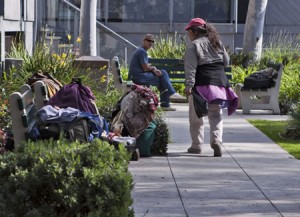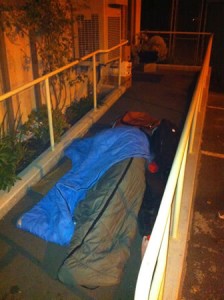
Even with the shelter in Laguna Canyon open for overnight stays for about 50 homeless individuals, citations for illegal lodging have more than tripled in one year, according to police records.
Lt. Jason Kravetz said the police department now has permission from downtown business owners, via a form letter, to cite homeless people who are sleeping in merchant breezeways and landings. The letter was sent out by the police department in response to vagrancy complaints, he said.
Another factor for the increased citations, said Kravetz, is that police officer Jason Ferris has returned to his position as the department’s community outreach officer and is again overseeing the activities of homeless people in town and their effect on local businesses. Ferris issued 132 out of 193 illegal-lodging citations last year after returning from regular summer patrol, said Kravetz.
But at least one advocate believes that number constitutes harassment.
“Because of the incredible volume of citations for sleeping in public,” stated Leonard Porto in a document demanding the city to cease harassment of the homeless, “folks are forced to sleep on private property. They have no other choice.”
Porto, a recently displaced Corona del Mar resident and computer network-support business owner now living in his car, is a self-taught law student who submitted a formal legal brief to the U.S. Supreme Court, Porto v. City of Laguna Beach, last year. The writ of certiorari requested a review of the city’s scuba-diving laws after Porto, a rescue certified scuba diver, was ticketed for allegedly disobeying a lifeguard. His argument was that it was an infringement on his civil rights. The court declined the request.
Porto is now concentrating his research efforts on obtaining public records from the city regarding the illegal-lodging citations. He has received copies of the citations as well as copies of police department photos of the alleged offenders from the city clerk’s office under the Public Records Act.
Kravetz said the homeless in question are given ample warning and even a ride to the alternative sleeping location (ASL) in the canyon. “By this point, they should all be aware of the ASL and using it,” he said. “Now our focus is to issue citations to the repeat offenders so we can get them into the Homeless Court (a county-services outreach program in Santa Ana) and get them to abide by the rules.” Of the 193 tickets issued, 35 went to alleged repeat offenders. Repeat offenders, said Kravetz, are given transportation passes out of town.
In 2010, 64 tickets were issued to homeless people for illegal lodging; in the first month this year, 10 citations have been handed out.
In the demand letter, Porto is calling for the city to “immediately cease the harassment of homeless and mentally ill persons sleeping on public property.” He contends that the city is violating the Sipprelle Settlement Agreement, which refers to a threatened ACLU lawsuit filed in December 2009 claiming the city’s controversial “anti-camping” ordinance violated basic human rights of homeless people. The city quelled the legal threat by curtailing citations and establishing a temporary sleeping shelter in the ACT V parking lot 1.5 miles from downtown on Laguna Canyon Road, which was replaced a year later with the ASL near the city’s dog park three miles north of town.
“You are also aware that the only homeless shelter has been operating at full capacity,” Porto writes in his demand, “and is unsafe due to the consistent level of violence.” Porto’s demand letter was filed with the city clerk and is stamped Nov. 7, 2011, by the city clerk’s office, City of Laguna Beach.

Mark Miller, director of programs for the homeless shelter and on-site supervisor, asserts the program is running smoothly.
“We deal with mental health issues and substance abuse issues all the time,” said Miller, who is also associate executive director for the Friendship Shelter, a local residency shelter for qualified homeless individuals. “We have put people who have substance abuse into treatment, they have received treatment and we have enrolled them in our self-sufficiency program at the Friendship Shelter and followed them all the way through to transitional housing. Part of the work we do at the ASL is getting people ready to make that transition.”
Miller said there are two people from the ASL currently in the Friendship Shelter’s structured self-sufficiency program and 30 in total who have made that jump. “What we do, then, at the ASL is work with those people to try and get them ready to take the next step,” he said.
Kravetz could not take a follow-up call Wednesday and is no longer allowed to speak to the press, according to the police department; all inquiries must go to the department’s public information officer, Louise Callus. The call was to ask why the majority of the tickets were issued as state misdemeanors, a criminal offense that carries a fine and, if not paid, can lead to an arrest warrant and jail time. The remaining issued violations were infractions of Laguna’s municipal code, considered a less-serious offense.




